|
|
Current Issue
Sibling Rivalry
Ping-Chung Ko Wrests World 10-Ball Title From Older Brother
Story By Keith Paradise
Photos By JP Parmentier
In his young career, Ping-Chung Ko has known the feeling of being the bridesmaid and not the bride in more than a few major championships.
He lost in the finals to countryman Jung-Lin Chang in last year's inaugural International 9-Ball Open and netted top-five finishes in the China Open and U.S. Open 9-Ball Championship two years ago. In 2015, the then 19-year-old Ko finished third in both the World Pool-Billiards Association's (WPA) World 9-Ball Championships and was eliminated in the semifinals of the World 10-Ball championships before watching his older brother, Pin-Yi, claim the title.
At the Predator World 10-Ball Championships in July, the final day had a déjà vu feeling to it. Once again, the Ko brothers reached the semifinals. This time, however, the roles were reversed. The younger Ko advanced to the title match, where he took advantage of a series of mistakes by opponent Joshua Filler to claim the first world 10-ball event to be played since his brother's victory four years earlier. Ping-Chung posted an undefeated record throughout the five-day, 64-player invitational tournament, along the way defeating a Billiard Congress of America Hall of Famer, a future Hall of Famer and one of the hottest young players in professional pool to earn the biggest victory of his career.
"Finally, I get the check," he said, smiling. "It was like a nightmare. I was never able to make it to the end. This is a breakthrough. To prove that I could do it, I practiced and practiced and kept on practicing until it was right."
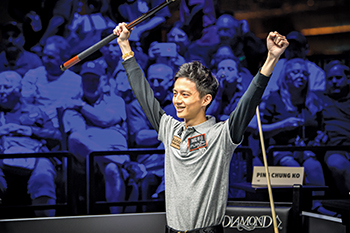
The 24-year-old Ko went undefeated in his run to his first world title.
Of course, the fact that the event was played for the first time in four years was a victory in itself. Attempts had been made recently to revive the tournament, with tentative dates set for a World 10-Ball Championship in Manilla last year.
When plans for the tournament fell through, Predator Group president Karim Belhaj decided to take matters into his own hands. Belhaj and his billiard products company had explored the idea of creating a professional tour a decade ago but ultimately scrapped the idea when the economy crashed. With a more stable economic climate, Belhaj revisited his plan to do something bold that could also serve as a prototype for eventually building that tour the company explored 10 years earlier.
"Events are critical to the development of the sport," Belhaj said. "Without a pro tour, it's tough to develop a strong coaching program and a strong junior program. You need to create an ecosystem."
While Belhaj was looking for an event that could be used as a blueprint to develop a tour, Ozzy Reynolds and his crew at Cue Sports International were itching to put together a tournament of their own.
For years, CSI has operated the BCA Pool League national and world championships in Las Vegas, and each year the amateur players have had the same request: bring back the professionals. The organization produces the U.S. Open 8-Ball and 10-Ball Championships each year nearby at Griff's pool room, but league membership hasn't been keen on traveling through the Las Vegas heat to watch pool. When Reynolds assumed the reins at CSI a year ago, he said the requests were frequent from the leagues.
"One of the major complaints of that tournament and a couple of earlier tournaments was that the pros weren't here," said Reynolds. "People really wanted the pros back in the building. They didn't want to get in a shuttle and go elsewhere. They wanted to watch a pro event right here."
While Reynolds and his group began developing ideas for a competition in Vegas, Belhaj contacted them with his idea for a world 10-ball tournament. The two men spoke initially a year ago and explored the idea further during discussions at the Mosconi Cup in London. A couple of weeks later, plans for the Predator World 10-Ball Championship were officially announced.
Rather than charge for admission and online streaming, CSI and Predator instead offered both for free in order to gain as many fans both in seats and online as they could attract.
"The ultimate goal was to get maximum exposure, as many eyeballs as possible, reach around the globe, get more interest in what we're doing and do a really good job, so the event grows, and people can't wait to watch it in the future," Reynolds said.
Ko opened this newest iteration of the tournament with an 8-6 victory against Germany's Tomasz Kaplan, defeated American Danny Olson, 8-4, and completed the first phase of the two-stage event with an 8-6 defeat of newly elected BCA Hall of Famer Alex Pagulayan. With eight players on both the winner's side and one-loss side remaining, the tournament shifted to a single-elimination format for the second stage, with the race length extended to 10 and players on the winner's side matched against the competitors on the one-loss side. After surviving Marc Bijsterbosch of the Netherlands, 10-7, Ko again faced Pagulayan in the quarterfinals. After splitting the first six games of the set, Ko used a pair of victorious safety exchanges to take a 5-3 lead and took advantage of Pagulayan's breaking struggles to pull away and win, 10-4.
"It's one of those pool matches that you can't do anything about it. I tried everything I could," Pagulayan said. "I played decent overall but I fought hard the whole tournament, so I was happy about that. Last thing I want to see is myself give up."
Although he lost the tournament, the Filipino may have won best comment of the event. During the early stages of his quarterfinal match with Ko, play was momentarily halted when the hotel's fire alarm activated. With the emergency lights flashing and the alarm sounding, Pagulayan and Ko opted to continue playing.
"We don't care about that," Pagulayan told the referee. "At home, we play with chickens running around. Same thing in China."
Meanwhile, reigning champion Pin-Yi Ko was working his way through the other half of the bracket. After defeating Ariel Casto in his opening match, the elder Ko was defeated by Pagulayan, 8-6. Now playing on the one-loss side of the bracket, Ko rallied and defeated Olson, 8-4, and Chris Melling, 8-5, to earn a spot in the final 16. He then opened the single-elimination portion of the tournament with an impressive 10-2 victory against Johann Chua and used a pair of breaks and runs along with some uncharacteristic misses from opponent Jung-Lin Chang to take an 8-4 lead and hold on to win, 10-8.
Heading into Friday's final day, it was possible that the two brothers could face each other in the championship match. Pin-Yi opened the day's competition against reigning WPA and U.S. Open 9-Ball champion Joshua Filler of Germany, who wasn't even sure he wanted to finish the tournament earlier in the week.
After posting a first-round 8-5 victory over Chinese 8-ball champion Fan Yang, the young German was obliterated 24 hours later in the following round, struggling to find his break shot and losing to Chua, 8-1. With his one-loss side match the next day and his game feeling like it was nowhere to be found, Filler contemplated leaving Las Vegas.
"To be honest, after that match I gave up actually," Filler said. "I told my wife, 'Let's book a flight.' I was so annoyed by this match. I just played so bad. I didn't have the rhythm."
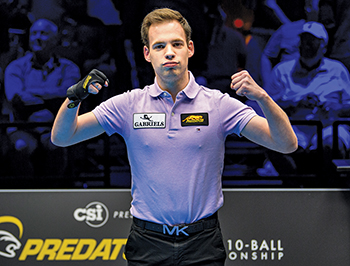
After considering an early flight home, a mentally fatigued Filler rebounded to battle his way to the World 10-Ball final.
Instead, Filler and his wife, Pia, swung by Griff's, which doubles as the local training and rehabilitation facility for professionals. Filler played his way out of his funk during a match with Pagulayan at the pool hall and decided to scrap any ideas of heading to the airport. The German opened play on the one-loss side with an 8-4 decision against Fedor Gorst, then followed that performance with a pair of 8-2 drubbings against Gerson Martinez and Alex Kazakis to reach the final 16.
Playing in the opening match of the day on the live streaming table against Jayson Shaw, the two competitors put on a display that was must-see television. Using six combined break-and-runs and effective safety play, Shaw and Filler split the first 16 games of the match. The young German took the lead in the 17th game, breaking, executing a long cut shot on the 1 ball and running out — giving the Diamond table in the arena a pensive slap as he walked back to his chair. He then closed out the match in the next rack when Shaw failed to pocket a ball on the break.
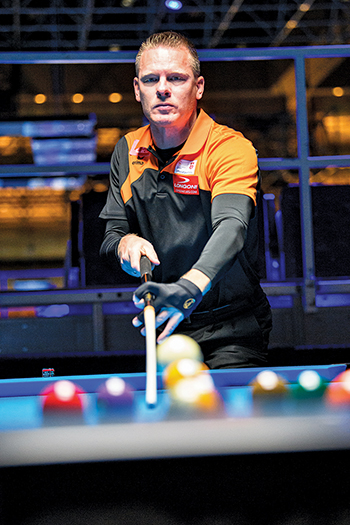
Feijen had his eyes on a double win in Vegas.
Filler would be pushed again in the quarterfinals against a red-hot Niels Feijen, a man who was a combined 12-0 between the World 10-Ball and the Diamond Las Vegas Open that had been played in the days before. The German built an early 5-2 lead in a race-to-10 with a couple of break-and-runs along with a Feijen scratch. He then thwarted a mid-match rally from his opponent, pushing the lead to 8-5 with a jump shot in the 12th rack and a run out in the following game. The Dutchman tacked on a couple of games and had an opportunity to tie the match at 8-8 but missed a shot. Filler cleared the table, then added a break-and-run to close out the match and advance to the semifinals against Pin-Yi.
Filler didn't win his semifinals match against the elder Ko as much as he survived it. Filler jumped out to an early 3-0 advantage, but Ko fought back to tie the match at 5-5. Ko gained the lead for the first time in the 11th game when he capitalized on the German's scratch off of a kick, but Filler responded with four straight victories to build a 9-6 lead. With the reigning U.S. Open 9-Ball champ breaking in the 16th game, it appeared Filler was mere minutes away from securing his spot in the evening's finals. Instead, he misplayed position and lost the game. He went on to miss two more shots in the next game. With the score now 9-8, Filler engaged Ko in a safety exchange after the break and capitalized on an opening left by his opponent. He executed a longshot on the 1 ball, then methodically ran out the rack to win the match.
Normally one to pump his first and let out a guttural yell after a big match, Filler instead collapsed onto the table and let out a few deep breaths like he'd just gotten out of a speeding ticket.
Prior to the finale, Pin-Yi pulled his younger brother aside to offer words of advice: "Try your best, relax and try not to feel any pressure. Just treat the match like practice." The younger Ko certainly didn't look pressured in his semifinals match against Japan's Masato Yoshioka, as he took advantage of a handful of errors from his opponent to cruise to a 10-3 victory.
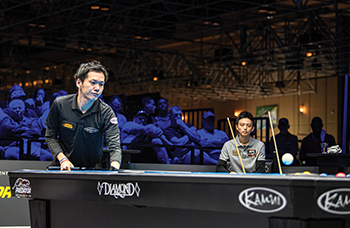
Yoshioka defied the odds throughout, battling to the semifinals before losing to eventual champion Ko (seated).
After his near-miss victory in the semifinals, Filler hoped some food and rest would help. He went back to his room, changed into some shorts and t-shirt and headed to a nearby McDonalds. It appeared that the Big Mac therapy session had worked early on, as the German used three run-outs from the break to build a 4-2 lead. Ko called a timeout and left the arena. Walking beside him on his journey to and from the arena was his big brother, serving as a security blanket and stress release.
"My brother didn't say anything to me," Ping-Chung said. "We just see each other and relax. We just made some jokes. The last couple of years, Joshua has played really well and I just wanted to challenge him. I want to compete with him. I don't know if I can win, but I will do my best to try and win."
The break appeared to calm Ko and he won three of the next four racks to tie the match. When Filler misplayed a safety on the 1 in the next game, Ko had his first lead since his victory in the opening game of the set.
"In both matches today, I played pretty solid at the start of the match, but I couldn't get a good lead," Filler said. "I didn't get the chance to get three games ahead. But then, I missed some balls."
Filler broke and ran two of the next three games to even the match at 7-7, but Ko used a dazzling cut shot on the 3 ball and a bank on the 4 to regain the lead, 8-7. When Filler failed to pocket a ball on the break in the 16th game, the dozen or so residents of Chinese Taipei who made the trip to support both Ko brothers started to sense something in the air and cheered just a bit louder.
The junior Ko cleared the table to increase his lead to 9-7. When Ko banked in the 1 ball after his opening break in the final game, all Filler could do was close his eyes and nod in appreciation. At that point, "Little Ko," as he is called in the U.S., was starting to believe something might be in the air too.
"At that moment, I thought, 'Yeah, I think I can make this shot,'" said Ko. "And when I did it, I thought, 'I'm going to win this one.'"
As he authoritatively stroked the 5 ball into the corner pocket and sent the cue ball to the opposite end of the table for the 9 and 10 balls, his older brother joined him in that belief. Ko pocketed the remaining two balls and lifted his cue in celebration.
Disappointed, Filler said he felt good about his overall performance in the tournament but admitted he felt sluggish throughout the day.
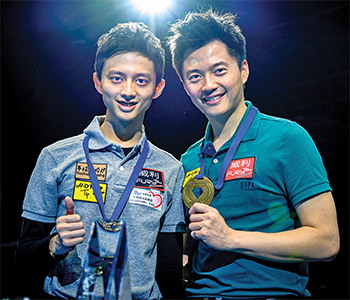
"Little Ko" took family honors, while Pin-Yi (right) finished tied for third.
"I didn't feel as strong as I have in the other matches," Filler said. "I don't know. I think it was just a bad day for me."
Another player who had a bad day was Shane Van Boening, who was one of the bigger stories when he was eliminated on the event's third day. Van Boening, a three-time U.S. Open 10-Ball Champion, lost a tight and break-and-run filled set to close friend and travel partner Billy Thorpe in the opening round, 8-5. He worked his way through the one-loss side of the bracket where he dispatched Hunter Lombardo, 8-6. The following morning Van Boening crossed cues with Peru's Gerson Martinez, a player whose previous high finish in a major international event was 33rd at the 2017 World 9-Ball Championship. On paper, it looked like a mismatch. At the table, it was anything but.
At the table and leading 5-3, Van Boening appeared to be on his way to increasing his lead but missed makeable shots on the 4 ball not once, but twice. The South Dakotan also struggled with his break, failing to find an open shot after the break in three consecutive games. Martinez tied the score when Van Boening missed a sharp cut shot into the side pocket. Martinez broke and ran in the 11th game to take a 6-5 lead, then used a couple of victorious safety exchanges to close out the match and pull off the upset.
Stunned, Van Boening packed up his cues and sat in his chair after the match and stared off for a few minutes until a spectator asked him for an autograph.
"I didn't feel comfortable, that's all I can say," said Van Boening, who was critical of the event's shorter race, alternate break format. "Probably too tired. It's a long trip in Vegas.
Reynolds said that the alternate break format and a rule prohibiting winning a match with a combination shot on the 10 ball were mandated by the WPA, although organizers did attempt to have the breaking rule changed.
"We tried to get an exception on the alternate break and were unsuccessful," he said. "But, that's okay. WPA has their rules. We followed them, and we had a terrific event anyways."
With the top American eliminated, the hopes of American pool fans fell onto the shoulders of last year's Mosconi Cup member Tyler Styer, who reached the quarterfinals against Yoshioka. When he took an early 4-0 lead in his match it started to appear like the United States would be represented on the event's final day. But Styer's game started to sputter as the match progressed. He missed several open shots and left a few loose safeties. The young man from Wisconsin stayed close with his Japanese counterpart but couldn't overcome his mistakes, falling 10-7.
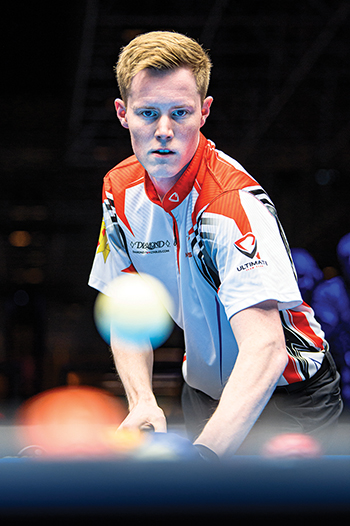
American Styer continued his solid play, finishing fifth.
"I just had some really finnicky, kind of tricky outs to get through in the middle part of the match and I couldn't get out and those rolled over to the end," Styer said.
World 10-Ball On the Move
One definite change that will be made with next year's Predator World 10-ball Championship and Diamond Las Vegas Open will be the dates on which they're played.
The tournament calendar shift is part of CueSports International's plan to move the BCA Pool League and USA Pool League championships to early spring. In 2020 and 2021, the championships will be held in March before shifting to February from 2022 to 2025. The 2020 CSI events, alongside which the World 10-Ball and Diamond Las Vegas Open will be staged, will be held at the Rio All-Suites Hotel and Casino from March 11-21.
Ozzy Reynolds, owner and CEO of CSI, stated that the calendar change was made in an attempt to appease and lure back some members who had stopped traveling to the tournaments in recent years. The date changes will result in subsequent alterations for the member leagues, as the time frames for amateur player eligibility for competition switch from a mid-year timeframe to a full-year schedule.
"It's not an easy thing to do and it certainly wasn't an easy decision," Reynolds said.

Reynolds (right, with Predator's Belhaj and winner Ko) will move dates in 2020.
For the first three decades that the then-Billiard Congress of America-run amateur league system operated, the championships were held in May. As additional amateur pool leagues began cropping up throughout the United States and the world, many began using a schedule similar to that of the BCA's leagues. In order to try and set itself apart from the others, the CSI moved its championships in 2013 from May at the Riviera Hotel and Casino to the Rio in July. As a result, Reynolds said CSI saw a 10 to 15-percent decline in its roughly 60,000-player customer base – mostly in cold weather areas such as the northern U.S. and Canada.
"What we learned, in hindsight, was that people in cold weather climates don't want to come to Las Vegas in July," he said. "They have very short summers and they don't want to spend it in Las Vegas where it's 110 degrees. For people in cold weather climates, that's excruciating."
Additionally, with many amateur players competing in multiple leagues during the year, the CSI events are the last championships of the year for those competitors. A league player that has already taken time off from work and paid to travel to two or three other league events may not have additional funds or vacation time left to travel to Las Vegas in July. With the championship moved to an earlier time of year it now becomes the first one on the calendar instead of the last.
"We felt like being first is a much better position," Reynolds said. "We ultimately want to be in February. We think that's a really good place to be. That allows our eligibility to fall into a nice calendar year."
– Keith Paradise
Top |
|






